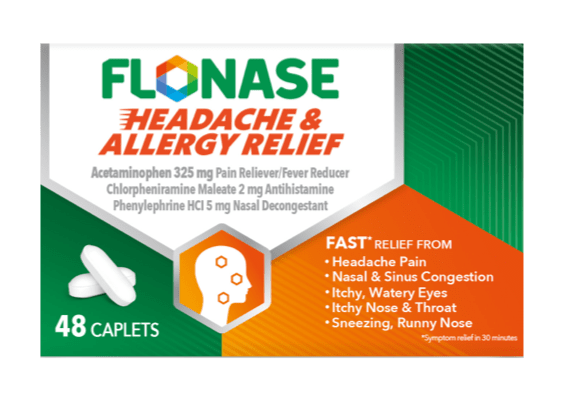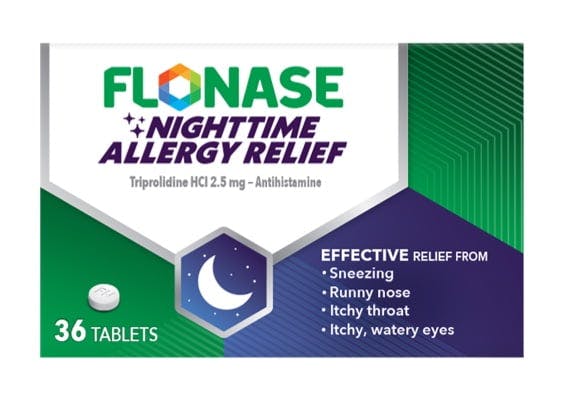-
What makes FLONASE product packaging recyclable now?
-
Is all FLONASE product packaging recyclable?
-
How do I open my FLONASE sustainable paper recyclable packaging?
Compared to the old packaging, the new, FLONASE eco-friendly, paper recyclable packaging is easier to open for users because you won’t need scissors. How To Use FLONASE SENSIMIST
-
What will FLONASE SENSIMIST feel like inside my nose?
Read TranscriptHide Transcript
WOMAN: When you use Flonase Sensimist, you may feel a very gentle mist. But the mist is so fine, you may not even notice it. Even if you don't feel the mist, don't use more than two sprays in each nostril per day if you're 12 or older and one spray in each nostril per day if you're administering to a child age two to 11.
ON SCREEN SUPER: Please see complete directions for use.
When you use FLONASE SENSIMIST, you may feel a very gentle mist, but the mist is so fine you may not even notice it. Even if you don’t feel the mist, don’t use more than 2 sprays in each nostril per day if you’re 12 or older, and 1 spray in each nostril per day if you’re administering to a child aged 2 to 11.
-
How does FLONASE SENSIMIST work?
-
What is FLONASE SENSIMIST Allergy Relief?
Read TranscriptHide Transcript
WOMAN:
Flonase Sensimist is an allergy medicine that works directly in your nose to relieve your allergy symptoms caused by pollen, mold, dust, and pets. There is virtually no drip. It's scent-free and features an ergonomically designed bottle with the shortest nozzle of any allergy spray. Plus, it's alcohol-free and available without a prescription.
FLONASE SENSIMIST is an allergy medicine that works directly in your nose to relieve a broad range of nasal allergy symptoms caused by pollen, mold, dust, and pet dander.
There is virtually no-drip, it is scent-free, features an ergonomically designed bottle with the shortest nozzle of any allergy spray, plus it is alcohol-free and available without a prescription.
-
What is the active ingredient in FLONASE SENSIMIST?
-
How is FLONASE SENSIMIST different than antihistamine pills?
Read TranscriptHide Transcript
WOMAN:
Unlike an antihistamine pill, which only blocks histamine, Flonase Sensimist works by helping to block six inflammatory allergic substances.
ON SCREEN SUPER: *Mechanism vs. most over-the-counter (OTC) allergy pills. Flonase nasal sprays act on multiple inflammatory substances (histamine, prostaglandins, cytokines, tryptase, chemokines, and leukotrienes). The exact number and precise mechanism are unknown.
Flonase Sensimist works right in your nose to relieve your allergy symptoms caused by pollen, mold, dust, and pets. In fact, barely any of it travels through your body.
There is virtually no drip. It's scent-free, features an ergonomically designed bottle with the shortest nozzle of any allergy spray. Plus it's alcohol-free and available without a prescription.
Unlike an antihistamine pill, which only blocks histamine, FLONASE SENSIMIST Allergy Relief works by helping to block 6 inflammatory allergic substances.*
FLONASE SENSIMIST works right in your nose to relieve your allergy symptoms caused by pollen, mold, dust, and pets. In fact, barely any of it travels through your body.
There is virtually no-drip, it is scent-free, features an ergonomically designed bottle with the shortest nozzle of any allergy spray, plus it is alcohol-free and available without a prescription.
*Mechanism vs most OTC allergy pills. FLONASE nasal sprays act on multiple inflammatory substances (histamine, prostaglandins, cytokines, tryptases, chemokines and leukotrienes). The exact number and precise mechanism are unknown.
-
Can children use FLONASE SENSIMIST?
-
Can I use FLONASE SENSIMIST with other medicines?
Read TranscriptHide Transcript
WOMAN:
Flonase Sensimist can be used with most non-prescription and prescription medicines. However, medicines for HIV infection, medicines with glucocorticoids, and pills for fungal infection may cause the level of Flonase Sensimist in your body to become too high. That's why it's important to tell your doctor or pharmacist about all the medicines you take, including Flonase Sensimist.
FLONASE SENSIMIST can be used with most non-prescription and prescription medicines. However, medicines for HIV infection, medicines with glucocorticoids, and pills for fungal infection may cause the level of FLONASE SENSIMIST in your body to become too high.
That’s why it’s important to tell your doctor or pharmacist about all the medicines you take, including FLONASE SENSIMIST.
-
Does FLONASE SENSIMIST have side effects?
Read TranscriptHide Transcript
WOMAN:
Serious side effects are rare with Flonase Sensimist because Flonase Sensimist works in your nose and barely any of it travels through your body. However, like all medicines, Flonase Sensimist can cause side effects in some people. Here are some side effects that have been reported with Flonase Sensimist, and what to do if you experience any of them.
If you have an allergic reaction to the product with sudden swelling of face or tongue, a rash, wheezing, or feeling faint, stop using Flonase Sensimist and see a doctor right away. If you experience a nose injury with severe or frequent nosebleeds, apply pressure to your nose, stop using Flonase Sensimist and see a doctor.
If you experience a constant whistling sound that does not go away, this could be a sign of damage to your nose. Stop using Flonase Sensimist and see a doctor right away. Have a yearly eye exam to check for eye conditions like cataracts or glaucoma, which can cause cloudy or reduced vision. Read the drug facts on the back of Flonase Sensimist package for more details.
Talk to your doctor if you're concerned that a child using Flonase Sensimist may experience growth effects, such as a slower growth rate. Also speak to your doctor if a child, between the ages of two and 11, needs to use Flonase Sensimist for longer than two months a year. Finally, talk to your doctor or pharmacist, if you experience other side effects, such as headaches or sneezing, a bad taste or smell, minor nose bleeds, or a dry or irritated nose or throat.
Serious side effects are rare with FLONASE SENSIMIST because FLONASE SENSIMIST is applied locally at the source without traveling through the body.
However, like all medicines, FLONASE SENSIMIST can cause side effects in some people. Here are some side effects that have been reported with FLONASE SENSIMIST and what to do if you experience any of them.
-
How long should a bottle of FLONASE SENSIMIST last?
Read TranscriptHide Transcript
WOMAN:
How long your Flonase Sensimist lasts depends on the number of sprays indicated on the bottle. Assuming you follow the instructions for priming the pump, you're 12 or older, and use two sprays per nostril each day, a 60-spray bottle will last you two weeks, and the 120-spray bottle will last you four weeks.
Remember, Flonase Sensimist is designed for the volume viewing window to monitor volume in the bottle.
How long your FLONASE SENSIMIST lasts depends on the number of sprays indicated on the bottle.
Assuming you follow the instructions for priming the pump, you’re 12 or older, and use 2 sprays per nostril each day:
A 60-spray bottle will last you 2 weeks.
And a 120-spray bottle will last you 4 weeks.
For children ages 2 to 11 who use 1 spray in each nostril each day:
A 60-spray bottle lasts 4 weeks.
And a 120-spray bottle lasts 8 weeks.
Remember, FLONASE SENSIMIST is designed with a volume viewing window to monitor volume in the bottle.
-
What if I feel stinging in my nose or sneeze?
-
Who should not use FLONASE SENSIMIST?
-
Why is FLONASE SENSIMIST labeled to relieve itchy, watery eyes only for ages 12 and older?






